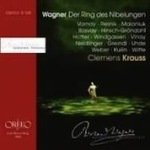This first “authorized” edition of Clemens Krauss’ 1953 Bayreuth Ring cycle purportedly stems from the original Bavarian Radio master broadcast tapes. As such, we might expect a sonically superior product to supercede previous “non-official” CD incarnations from multi-generational sources, be it Opera D’Oro’s smooth, mid-range-dominant equalization or the brighter, hissier Foyer and Laudis versions.
As it happens, Orfeo’s sonic differences prove subtle at best. Quiet passages boast slightly more presence and definition, while the voices and strings seem to acquire a little extra warmth and bloom. And whereas the source tape for all previous Krauss Ring releases begins Siegfried Act 1 with the two bassoons at measure four, Orfeo’s source restores the first three measures of solo timpani. That said, Andrew Rose’s Pristine Audio digital download restorations offer a less constricted, more open, and heftier acoustic ambience.
Although most of the principal cast members can be heard to better sonic advantage in the live 1955 Decca Bayreuth Ring issued by Testament, you might argue that here Hans Hotter is in marginally fresher voice when it counts the most (Die Walküre’s final scene, the opening of Siegfried Act 3). On the other hand, Wolfgang Windgassen is not so vocally and dramatically secure with both Siegfried roles as he became later on–witness the Forging Song’s train wrecks. No complaints regarding Astrid Varnay’s powerfully projected Brünnhilde, Gustav Neidlinger’s amazing Alberich, and Regina Resnik in her youthful, most agile prime as Sieglinde. Krauss’ swift tempos certainly keep the music afloat and moving forward, reminding us that Bayreuth is a theater first, and a shrine second.
Should Pristine Audio’s interventionist transfer methods not suit your taste, Orfeo’s “legit” Krauss Ring release should be considered over cheaper CD and download alternatives. The booklet notes include a lengthy essay and full synopsis of all four operas, but no libretto.
































